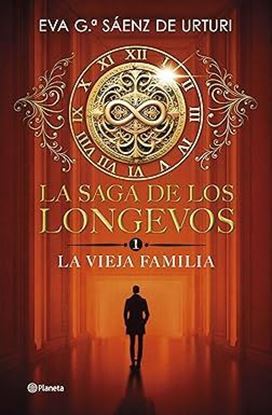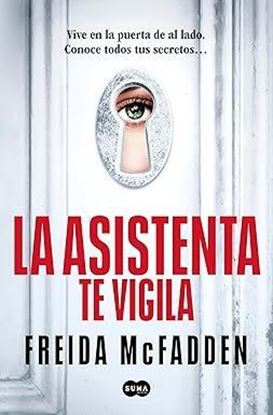

QUIEN ERES? (BOL)
Martina es profesora y se resiste a tener que comunicarse con las personas a través de una pantalla, algo que se está poniendo muy de moda en la España de los noventa. Los chats atraen a todo el mundo, pero, sin duda, comienzan a ser una gran fuente de problemas. Y justo eso es lo que se encuentra Martina cuando, animada por unos amigos, acepta que entre en su casa, en su salón y en su vida su primer ordenador. Chats, amigos, risas, noches interminables de diversión... Todo se vuelve idílico cuando una persona de ese nuevo mundo, a quien ni ha visto nunca ni conoce, llama su atención, y su sola presencia a través de la pantalla la atrae cada vez más. Sin embargo, de pronto alguien la persigue y acosa, y empieza a tener miedo, sobre todo porque no tiene manera de averiguar si pertenece a la vida real o a la virtual.
650
520
LA SAGA DE LOS LONGEVOS 1. LA VIEJA FAM.
Iago del Castillo es un carismático y atractivo longevo de 10.300 años de edad con un cerebro prodigioso.
Sin embargo, cuando una mañana despierta en San Francisco, lejos de su hogar en Santander, no es capaz de recordar ni su nombre ni los detalles de la misteriosa investigación que le ha llevado hasta allí; una investigación con la que pretende descifrar los motivos por los que ni él ni los demás miembros de su familia envejecen.
Pero ni Iago ni Héctor, su padre, tienen intención de compartir los resultados; ellos son conscientes de los riesgos y el sufrimiento que implica su modo de vida. Son sus hermanos Jairo (un conflictivo escita de casi 3000 años) y Kyra (una huidiza celta de 2500 años) los que, cansados de transitar solos a través de los siglos y hastiados de tener que enterrar a sus hijos, están empeñados en crear una estirpe de longevos como ellos.
Al mismo tiempo, Adriana, una arqueóloga especializada en Prehistoria, está dispuesta a aprovechar que el destino la ha traído de vuelta a su Santander natal para aclarar el extraño suicidio de su madre ocurrido quince años atrás.
Desde el principio, Iago y ella sentirán una poderosa atracción el uno por el otro, aunque ambos intenten ignorarlo.
1,100
880
LA VIDA IMPOSIBLE
La nueva novela del autor de La biblioteca de la medianoche
"Lo que parece magia no es más que una parte de la vida que todavía no entendemos..."
Cuando Grace Winters, una profesora de Matemáticas jubilada, hereda una casa desvencijada en una isla del Mediterráneo tras la muerte de una antigua amiga, la curiosidad se apodera de ella. Llega a Ibiza sin billete de vuelta, sin guía de viaje y sin planes.
Entre las colinas escarpadas y las playas doradas de la isla, Grace busca respuestas sobre la vida de su amiga y sobre cómo llegó a su fin. Lo que descubre es más extraño de lo que podría haber soñado. Pero, antes de sumergirse en esa verdad imposible, Grace debe reconciliarse con su pasado.
Repleta de maravillas y de aventuras, esta es una historia sobre la esperanza y sobre el poder de los nuevos comienzos para cambiarte la vida.
1,350
1,080
LA ASISTENTA TE VIGILA (3)
Yo solía trabajar limpiando las casas de otras personas, ahora apenas puedo creerme que este sea mi hogar. La encantadora cocina, la calle tranquila, el enorme jardín en el que los niños pueden jugar. Mi marido y yo hemos ahorrado durante años para que mis hijos tengan la vida que se merecen.
Aunque siento algo de recelo hacia nuestra vecina, la señora Lowell, veo su invitación a cenar como una oportunidad para hacer amigos. Cuando su doncella abre la puerta con un delantal blanco y el pelo recogido en un moño tirante, sé exactamente cómo se siente. Pero su gélida mirada me produce escalofríos...
La doncella de los Lowell no es lo único extraño de nuestra calle. Estoy convencida de que alguien nos observa. Y cuando conozco a la mujer que vive enfrente, sus palabras me dejan petrificada: «Ten cuidado con tus vecinos».
¿Cometí un terrible error mudándome aquí con mi familia?
Pensaba que había dejado atrás mis secretos oscuros. Pero ¿podría ser este apacible barrio residencial el sitio más peligroso de todos?
1,400
1,120
BIENVENIDOS A LA LIBRERIA HYUNAM-DONG
Yeongju ha pasado toda su vida haciendo lo que se esperaba de ella: estudiar, casarse y tener un trabajo respetable. Hasta que un día, cansada, abandona su trabajo de oficina para perseguir su sueño: abrir una librería en un barrio tranquilo y encantador de Seúl. Allí, rodeados de libros, Yeongju y sus clientes se cobijan del mundo. Del barista solitario a la vendedora de café infelizmente casada, todos han vivido decepciones en el pasado. La librería Hyunam-Dong se convertirá en el lugar donde todos ellos aprenden a disfrutar de la vida.
Una tierna historia sobre la importancia de encontrar paz y aceptación en la vida, y sobre el poder curativo de los libros.
1,450
1,160
EL MEJOR LIBRO DEL MUNDO
NADIE ANTES QUE MANUEL VILAS HA EXPLORADO LA VULNERABILIDAD DE UN ESCRITOR COMO LO HACE ÉL AQUÍ.
Su nueva novela, de clara inspiración autobiográfica, narra la historia vital de un escritor que se levanta todas las mañanas, desayuna y se va a trabajar a su oficina particular para crear el que espera que sea el mejor libro del mundo. En esta divertida, irreverente y locuaz historia, Vilas rompe el famoso techo de cristal para contar a todo el mundo quién y qué es un escritor desde un lugar distinto, en el que nunca ha sido expuesto, desde su fragilidad: el síndrome del impostor, la constante -y cómica- comparación con los demás, las decepciones, la incertidumbre, convivir con la alegría y el fracaso y así hasta sus últimos días.
Una mirada única, ocurrente y muy real sobre cómo un escritor lucha día tras día por ser apreciado, sentirse querido y pasar a la posteridad. Pero siempre desde la comedia.
1,250
1,000














